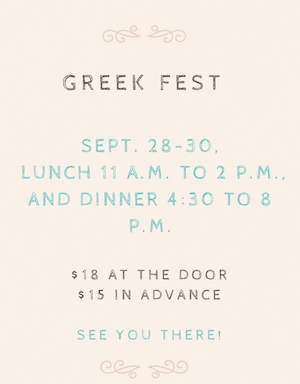By Heidi Scott

It started over 80 years ago with a dinner among fellow church goers. They may have served chicken. Maybe spaghetti. Nobody is quite sure. But one fall in the 1930s, members from the Holy Trinity Greek Orthodox Church got together for dinner. And they did it again the next year. And the next year. The food was so good that eventually they started inviting their friends, who invited their friends, and… you get the idea. Before they knew it, a tradition was set.
This was during the Great Depression, so most people had more time than money. Women offered to come to the church kitchen to bake together. They spent months making pastries. Then, years later they started to bake bread. Then making tzatziki sauce. And on and on until the dinner festival became a true Greek feast.
Today, Greek Fest is much the same, with volunteers who are typically retirees, college students, or others who have the time and desire to see the festival continue. It is an ongoing challenge to find enough volunteers to cook and bake. Many Greek festivals in the nation sell pre-made food items that are shipped from factories. Holy Trinity refuses to do that. “It just rings wrong not to make our own,” says Father Stephen Supica.
He confesses that he thinks the Greek food here is the best you can find. And there is an additional benefit in the way that people grow closer when they serve together.
He says, “It’s hard not to get to know someone when you’re standing next to them, stirring a pot of boiling pasta for two days. In our world, we sorely need places to belong. We feel like this festival is just the same as it was at the start. We are just having dinner together, and inviting two or three thousand of our closest friends.”
 The menu includes traditional Greek comfort foods like orzo with browned butter and myzithra cheese, beef kapama, souvlakia, cabbage rolls, loukoumades, and of course, handmade baklava. The preparation for the three-day dinner takes months. The baklava alone takes four months to prepare, with 800 dozen diamonds made just this year.
The menu includes traditional Greek comfort foods like orzo with browned butter and myzithra cheese, beef kapama, souvlakia, cabbage rolls, loukoumades, and of course, handmade baklava. The preparation for the three-day dinner takes months. The baklava alone takes four months to prepare, with 800 dozen diamonds made just this year.
Supica’s wife, Presvytera Irene Supica, admits that she is quite a spectacle when checking out from Costco with their supplies, including carts full of lamb, walnuts, and butter. They order beef, vegetables, beer, wine, and coffee from other suppliers.
“We tried buying the tzatziki sauce premade one year, but no matter what we did to make it better, it was just awful,” she said.
So they continue to make it from scratch, like nearly everything else they serve.
But a good meal isn’t the only reason they continue to hold the festival.
Fr. Supica says, “We want people who haven’t been here before to see the church. They should know that they CAN see the church. Everyone is welcome to walk around our building. They can even attend the Vespers service with us on Saturday evening. There is a bookstore with literature and religious items, for those who are interested in learning more. Members are available to answer questions about us and our religion.”
Holy Trinity Church was built in the 1932, with the sanctuary added in 1948. Everyone who built it is gone now, so the story is a bit unclear exactly when the traditional dinner shifted into a formal festival. Church legend tells that a kind old man from Missoula named Pete Poulos used to come to the Festival every year. He claimed that he had done all the research he possibly could, and believed Spokane to have the oldest Greek Festival in the United States.

“I don’t know if you could ever prove something like that,” adds Irene, “but we certainly are one of the oldest anyway. I’ve looked into it myself, and I have yet to find one that’s older,” he said.
The Supicas have been serving in Spokane for nearly 30 years, and have seen little change in the way the festival is run. The dinner has always been served downstairs. The grill outside has been there since before they came. Even the dancing group has been performing for at least that long, with kids from the church learning and performing traditional Greek dances.
These dancers are as diverse as the congregation itself. Serbian, Irish, Russian, Bulgarian, and American. There might be one or two who are half Greek, but for the most part, the kids come from families with no actual Greek ancestry. And this doesn’t matter a bit. The congregation includes families from Ethiopia, Egypt, Lebanon, Cyprus, and among many other countries. The website and weekly newsletter are in five languages. Fr. Supica himself is a convert, raised in Kansas in a “vaguely Protestant context.” Presvytera Supica, however, is the quintessential Greek woman, daughter of a Greek Orthodox priest, and born in Athens.
When asked why they continue to hold the festival this way, Fr. Supica laughs, “Let’s face it, everyone can do hamburgers. This is a celebration of Greek culture, which a very pleasant culture. It isn’t exclusive. Everyone enjoys it. It is a place for everybody to come.”
Fr. Supica answers a few of the same questions every year, including “Are you Christian?” “Do you believe in Jesus?” “Do you believe in the Holy Trinity?” The answer to all of these is yes, and if you pay attention to the name of the church and icons in the sanctuary, there is no doubt where they stand on these issues.
It often surprised Americans how prevalent the Orthodox faith actually is, by some estimates, 12 percent of the world. If you can trust the Internet, many famous Americans belong to the Orthodox faith, including Jennifer Aniston, Yul Brynner, Tina Fey, Tom Hanks, Amy Sedaris, and Bob Marley. It is the single major religion in at least a dozen countries, with Greece, Macedonia, Romania, former Yugoslav Republic or Macedonia, and Russia topping the list. It is also one of the predominant religions in countries such as Egypt, Syria, Estonia, and Uzbekistan.

Fr. Supica often has to clarify what Orthodoxy actually is. He explains that the Greek Orthodox church is exactly like the Russian Orthodox Church, which is just like the Serbian Orthodox Church and so on. The only major difference is the language being used. The doctrine is the same. One can attend a Kenyan Orthodox Church one week and a German Orthodox Church the next, and not be surprised by anything. The name is different simply because of the language. Cultural aspects of the church may differ as well, such as the music and the food, but the texts and doctrine are the same.
Another common thread of Orthodox tradition, and often the biggest appeal for newcomers, is the importance of community and service. Holy Trinity has a formally organized group called Philoptochos, or friends of the poor, which joins with Campus Kitchen from Gonzaga University to take meals to the House of Charity here in Spokane every Thursday.
In addition, a charity is chosen every year prior to the dinner festival, and a portion of the proceeds are donated. Sometimes the focus is on regional causes like wildfire recovery, and other years the church will share with more global charities, such as the Red Cross. There is some thought this year into collecting and donating to either Hurricane Harvey or the western states’ fire recovery efforts.
Orthodox members are often friendly and open to questions, but proselytizing is not something they are typically comfortable with. Regardless, they still find that around two or three people convert every year. Along with the sense of belonging, people are drawn to the authenticity of the culture. Orthodoxy don’t sugar-coat life, often believing that the hard way is the best way, regardless of how raw or ugly it may be. There is no attempt to sanitize life and death. Funerals typically happen almost immediately, with an open casket. Members embrace the imperfections of life.
And so it goes without saying that many church events are a bit messier than one would expect at a church. Fr. Supica says, “If you don’t like organized religion, then the Orthodox church is for you. We are the most disorganized bunch you’ll ever meet!”
Regardless, the Holy Trinity Greek Orthodox Church creates a wonderful experience for all who attend. If this is your first time attending, here are a few things to keep in mind:
- The church is located at 1703 N. Washington Street, Spokane, WA.
- The festival runs Sept. 28-30, with lunch from 11 a.m. to 2 p.m., and dinner from 4:30 to 8 p.m.
- Dinner is $18 at the door, $15 in advance.
- Parking is very limited, so you will have to find a place to park in adjacent neighborhoods. A police officer is usually on hand to help people cross the busy road.
- Come earlier in the festival, especially if you plan to buy pastries and bread, which almost always sell out by Saturday night. Friday night tends to be the busiest.
- The church is open to all visitors throughout the festival. Feel free to look around. The only place off limits is the altar, which is blocked off.
- If you are claustrophic, enjoy dinner outside at the grill. The seating downstairs tends to get a bit cozy.
- The Vespers service is at 6pm on Saturday night, and all are welcome to attend. No dress code required.
- If you miss it this year, don’t despair. The Greek Dinner Festival is always the last full weekend of September.
The Annual Greek Dinner Festival has changed over the decades, but in one way, it has remained absolutely the same. A sense of family still exists, no matter how many people attend. And they claim that, like any good Greek family, they aren’t happy until everyone leaves uncomfortably full.
FāVS wants to tell more stories like this. With your donation, we can.






